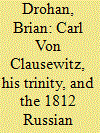| Srl | Item |
| 1 |
ID:
074421


|
|
|
|
|
| Publication |
2006.
|
| Summary/Abstract |
This article analyzes the 1812 Russian campaign using Clausewitz's concept of the trinitarian nature of war. This approach uses a case study to delve deeply into understanding the subtle, philosophical nature of Clausewitz's trinity. The article is serialized into two parts; the first discusses each of the trinity's elements. The second part applies each trinitarian element to the Russian campaign.
|
|
|
|
|
|
|
|
|
|
|
|
|
|
|
|
| 2 |
ID:
193829


|
|
|
|
|
| Summary/Abstract |
Although UN peace operations began with unarmed observer missions in 1948–1949, the first armed force—the UN Emergency Force (UNEF)—was deployed in 1956 due to the Suez crisis. Scholars and practitioners have since interpreted the UN Secretariat’s 1958 study of that experience, called the Summary Study, as a foundational text in the history of UN peacekeeping because it supposedly codified the key principles of impartiality, nonuse of force, and consent. But much of the Summary Study’s origin story is inaccurate or unknown. By explaining Secretary-General Dag Hammarskjöld’s intentions for the study, as well as how those intentions changed, this article argues that far from “codifying” foundational principles, the Summary Study did the opposite: it ensured that future peacekeeping operations would continue on an ad hoc, flexible basis that permitted the Secretary-General and Member States to exercise a wide range of discretion in determining how to conduct future operations.
|
|
|
|
|
|
|
|
|
|
|
|
|
|
|
|
| 3 |
ID:
159442


|
|
|
|
|
| Summary/Abstract |
By analyzing the use of baton rounds as riot control weapons during the Northern Ireland “Troubles,” this article explores the British Army’s difficult transition from colonial counterinsurgency to a war in which the army faced greater public sensitivity and scrutiny than before. British forces tried to minimize the use of force against rioters by introducing new non-lethal baton rounds. But soldiers often disregarded the rules of engagement by firing the weapons excessively and at unsafe distances, which resulted in injuries and deaths that infuriated the local population. The technological innovation of baton rounds thus undermined British counterinsurgency efforts.
|
|
|
|
|
|
|
|
|
|
|
|
|
|
|
|